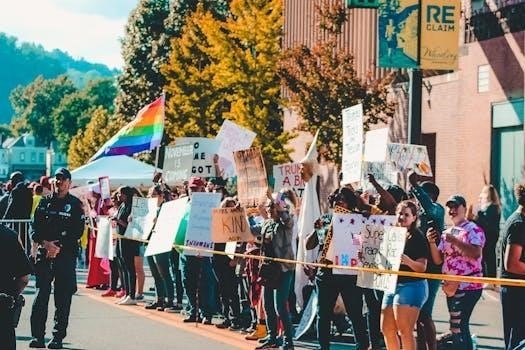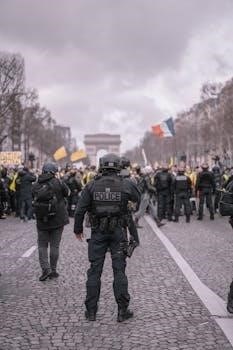Understanding Your Right to Remain Silent
Your right to remain silent is a cornerstone of legal protection. You are not obligated to answer any questions from police. This right prevents self-incrimination. Exercise this right by clearly stating you wish to remain silent.
Why Silence is Crucial During Police Encounters
Remaining silent during police encounters is crucial because anything you say can be used against you in court. Police are trained to elicit information, sometimes through subtle manipulation. Silence prevents accidental self-incrimination. It also protects you from misinterpretations of your words. By staying silent, you retain control over the information you provide, ensuring your rights are upheld. This also allows you time to consult with an attorney.

Your Right to Refuse Searches
You have the right to refuse searches of your person, car, or home without a warrant. Police need probable cause for searches. Politely decline, do not resist physically. Save any challenges for court.
When Police Need a Warrant
Police generally require a warrant to search your home or private property. A warrant is a legal document issued by a judge, based on probable cause of a crime. This document must specify the location to be searched and items they are seeking. Without a valid warrant, they cannot legally enter your home or search your belongings, with few exceptions.
How to Politely Decline a Search
If a police officer asks to search your person, car, or home, you can politely decline. Clearly state, “I do not consent to a search.” It’s crucial to be firm but respectful. Do not physically resist, as this could lead to further charges. Remember, your refusal cannot be used as probable cause.
The Right to Leave
If you’re not under arrest, you have the right to leave. Police cannot hold you against your will without legal justification. You are free to end the interaction at any time.
When You’re Not Under Arrest
If you have not been formally placed under arrest or detained, you possess the right to leave any police encounter. Law enforcement cannot hold you against your will without probable cause. You are not obligated to continue interacting with them. If you are not being detained, you are free to go; make sure to ask if you are free to leave.
How to Ask if You’re Free to Go
To ascertain if you’re free to leave, politely ask the officer directly, “Am I being detained? Am I free to go?” This direct approach helps establish your status clearly. If the officer says you’re not being detained, you can leave. If they say that you are detained, then you should exercise your right to remain silent and ask for a lawyer.
Your Right to a Lawyer
You have the right to legal counsel, especially if arrested. Request a lawyer immediately. Police cannot listen to calls to your lawyer. Do not make decisions without consulting them.
The Importance of Legal Counsel
Having a lawyer is crucial when dealing with law enforcement. They protect your rights and ensure you are treated fairly. A lawyer can advise you on your legal options, prevent you from self-incrimination, and navigate the complexities of the legal system. They understand the law and can recognize when your rights are being violated. Their expertise can be invaluable.
When to Request a Lawyer
Request a lawyer immediately if you’re arrested or suspect you might be. If police are questioning you, assert your right to remain silent and ask for legal counsel. Do not make any statements or sign anything without your lawyer present. Even if you believe you are innocent, speaking to the police without a lawyer can jeopardize your case. Secure legal representation immediately.

Police Entry onto Private Property
Police cannot enter your private property without a warrant or your consent. They need a legal justification to cross this boundary; Knowing your rights here is crucial for protecting your privacy and home.
Limits on Police Access
Police access to your private property is limited by law. They cannot freely enter your home without a warrant or your explicit permission. There are exceptions, such as if they are in pursuit of a suspect or if they see illegal activity happening in plain view. If they do not have these exceptions, they should not be there.
When a Warrant is Required
A warrant is typically required for police to search your home or private property; This legal document must be issued by a judge based on probable cause. It specifies the location to be searched and the items being sought. Without a warrant or valid exception, police entry onto your property can be unlawful. Always ask to see the warrant.
Police Conduct and Deception
Police are allowed to use certain deceptive tactics during investigations. This includes lying about evidence to try and elicit a confession. It is important to remain calm and understand this is a legal practice.
Are Police Allowed to Lie?
Yes, police are generally permitted to lie about evidence they possess. This tactic is often used to encourage a suspect to confess. Courts have upheld this practice as long as it doesn’t create a high risk of a false confession. This is a legal, albeit ethically questionable, method. Be aware that what police tell you may not be the truth.
How to Respond to Deceptive Tactics
When confronted with deceptive police tactics, the best response is to remain silent. Do not try to argue or prove your innocence, as this could be used against you. Assert your right to remain silent and request a lawyer immediately. Do not sign any documents or make any decisions without legal counsel. Remember, you are not obligated to help them build a case against you.

Filming the Police
You have the right to film police in public. Officers cannot legally stop you from recording them. They need a warrant to view your recordings. This is a crucial tool for accountability.
Your Right to Record
In public spaces, you possess the right to record police officers performing their duties. This is a vital aspect of citizen oversight and accountability. Law enforcement cannot legally prohibit you from filming or photographing them in these areas. Recording helps document interactions, ensuring transparency and potentially providing evidence if needed. Always be mindful of your surroundings while exercising this right, and never interfere with the police doing their jobs.
Limitations on Police Interference
Police have limitations on their ability to interfere with your recording activities. They cannot arbitrarily seize your recording devices or demand to view your footage without a warrant. Interference can be considered obstruction of justice and a violation of your rights. Law enforcement’s actions must be within legal boundaries when it comes to filming police, meaning they can not prevent you from filming if you are in a public space or on your own property.

Your Rights During a Traffic Stop
During a traffic stop, police must have probable cause. You have the right to ask why you were stopped. You are not required to consent to a search. Knowing your rights is essential.
Probable Cause and Legal Justification
Police must have probable cause to initiate a traffic stop. This means they need a reasonable belief a law was violated. They must articulate specific illegal conduct that led to the stop. Without probable cause, a stop can be deemed unlawful, and evidence obtained during the stop may be inadmissible in court. Understanding this legal threshold is crucial to protecting your rights.
What to Do if Stopped Illegally
If you believe you’ve been stopped without legal justification, remain calm and polite. Do not resist the stop, as this can lead to further charges. Clearly state you do not consent to any searches. Gather any evidence that could demonstrate the illegal stop. Contact a lawyer promptly to discuss the situation and protect your rights. Remember, you have the right to challenge the stop later in court.
Phone Privacy Rights
Your phone is protected by privacy laws. Police generally need a warrant to search it. They cannot freely access your phone’s contents. The Riley v. California case strengthens this protection. Assert your right to privacy.
When Police Can’t Search Your Phone
Police cannot search your phone without a warrant in most situations. This is due to privacy protections. The Riley v. California Supreme Court case established that a phone’s digital data is not a weapon. Therefore, a warrant is typically needed. They cannot search it incident to arrest. Unless there are exigent circumstances that require immediate action, like a bomb threat, your phone’s contents are generally off-limits without proper legal process. Remember your rights and assert them.
The Riley v. California Decision
The landmark Supreme Court case Riley v. California significantly impacts phone privacy. It ruled that police generally need a warrant to search a cell phone during an arrest. The court recognized that digital data is unlike physical items. The data does not pose an immediate threat to the officer. This ruling protects personal information stored on phones. This helps to prevent unwarranted intrusions by law enforcement. The decision established a higher standard for phone searches.
Protecting Your Rights
Knowing your rights is crucial for fair treatment. Educate yourself about your legal protections. Assert them calmly and firmly when needed. Seeking legal counsel is vital if your rights are violated.
The Importance of Knowing Your Rights
Understanding your rights is paramount when interacting with law enforcement. Many people are unaware of their constitutional protections, which can lead to unintentional self-incrimination or unlawful searches. Knowing your rights empowers you to make informed decisions and to stand up against potential overreach by the police. This knowledge is your first line of defense in any police encounter and can significantly impact the outcome of such interactions.
How to Assert Your Rights
To assert your rights effectively, remain calm and polite while clearly stating your position. If you are being questioned, firmly say you wish to remain silent and request a lawyer. If asked for a search, state clearly that you do not consent. Remember, you don’t have to explain yourself. Document the encounter as much as possible by filming if it is safe to do so.

